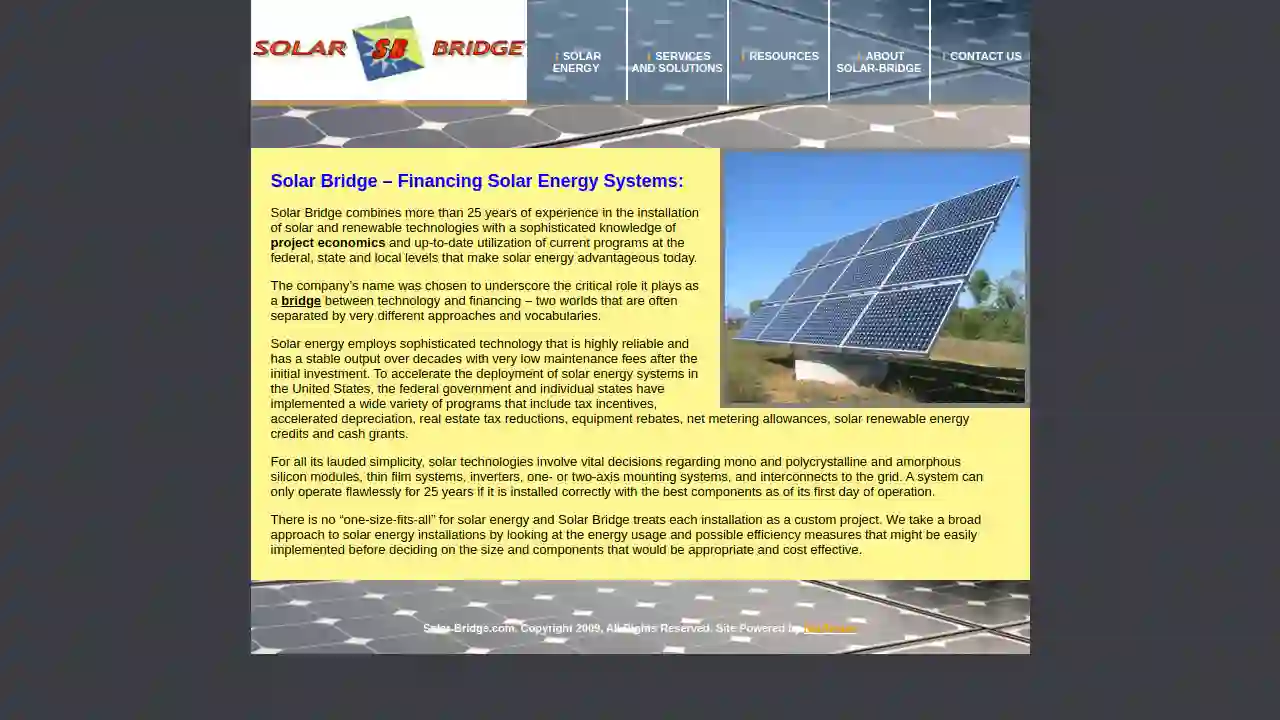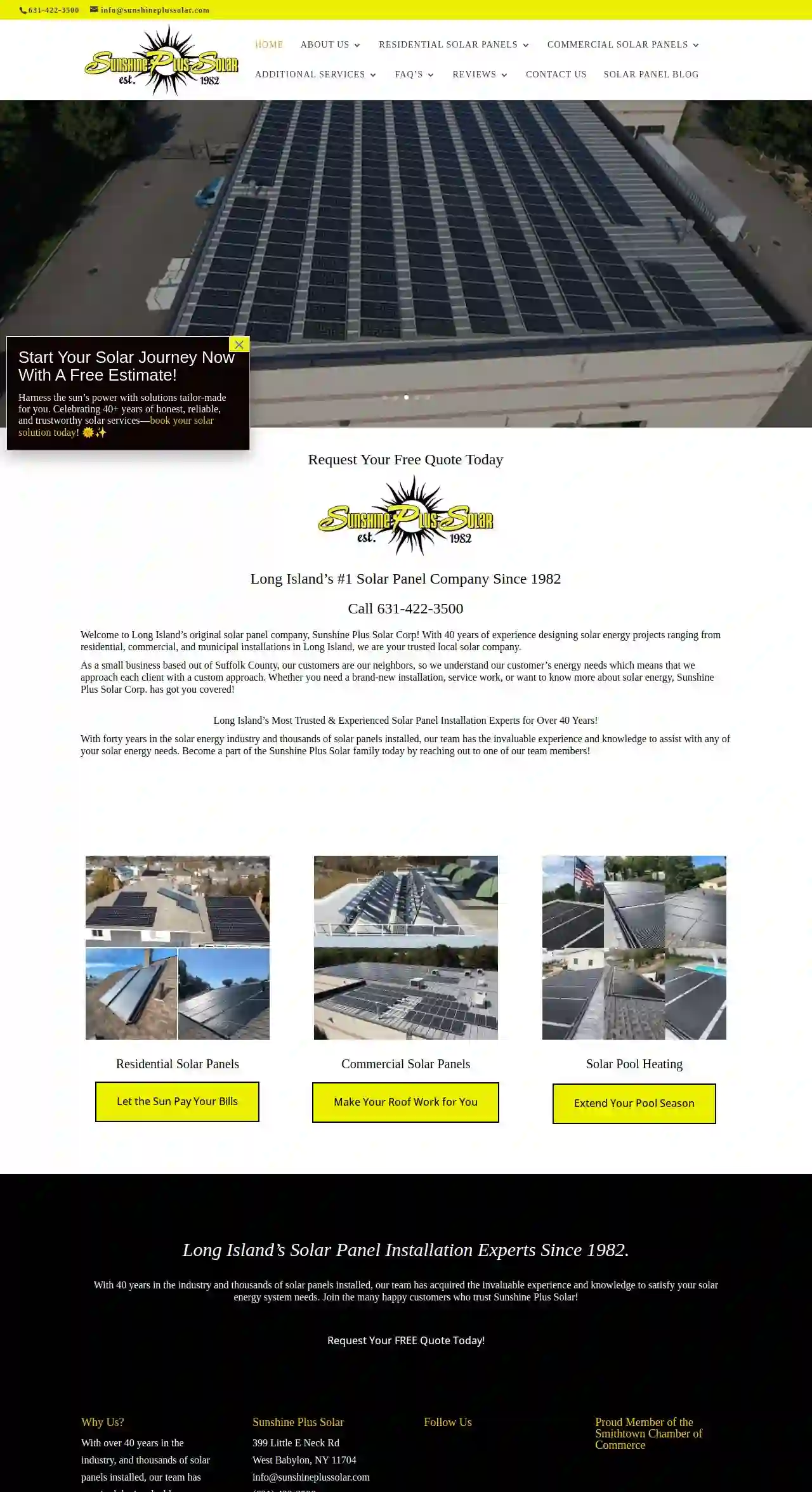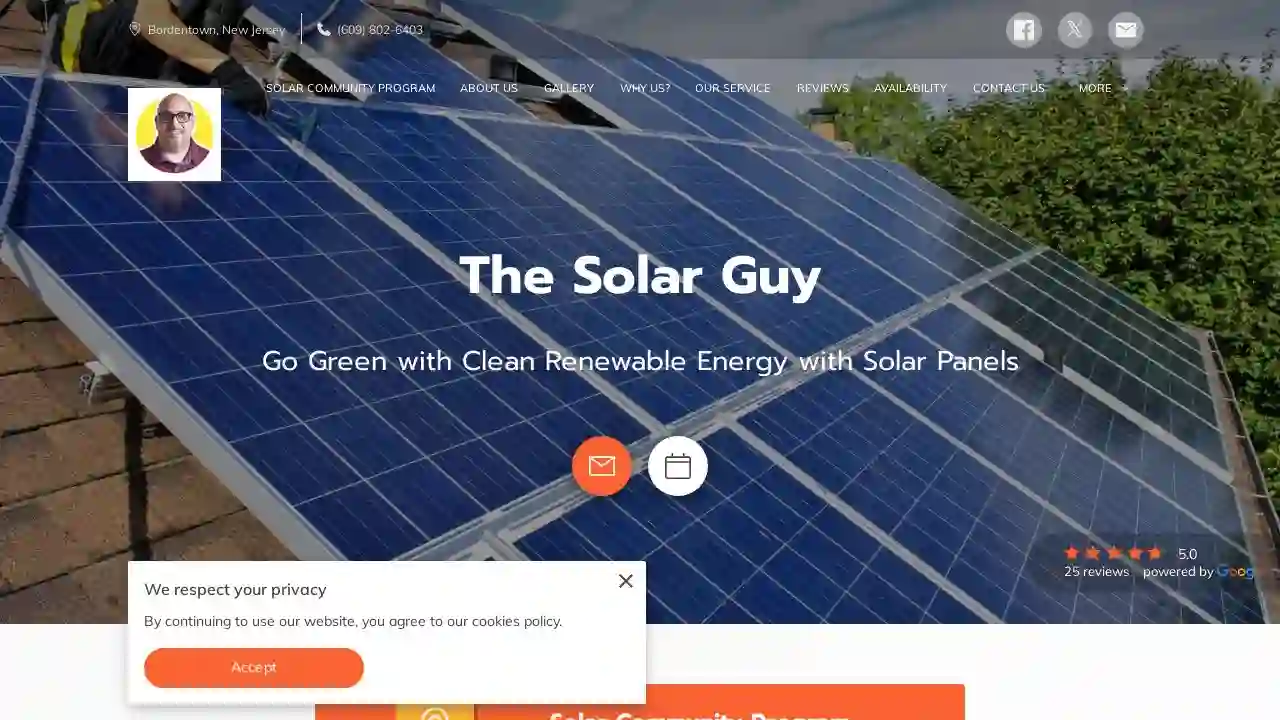Solar Installers Schuylkill Haven
Find Solar Panel Installers in Schuylkill Haven
Receive up to 3 Solar Installer quotes for your project today! Compare profiles, reviews, accreditations, portfolio, etc... and choose the best deal.

Solar Bridge LLC
340 East 64th Street, New York, 10065, USSolar Bridge combines more than 25 years of experience in the installation of solar and renewable technologies with a sophisticated knowledge of project economics and up-to-date utilization of current programs at the federal, state and local levels that make solar energy advantageous today. The company’s name was chosen to underscore the critical role it plays as a bridge between technology and financing – two worlds that are often separated by very different approaches and vocabularies.
- Services
- Why Us?
- Accreditations
- Our Team
- Gallery
Get Quote
Solar Me
4.9159 reviews1896 Englishtown Rd, Monroe, NJ, 08831, USYour Expert Local Solar Power Company in New Jersey. Solar Me is your local expert solar panel company in New Jersey with more than a decade of experience in home solar power! We offer Solar Panels, EV chargers, & backup generator installation for Residential & Commercial Buildings in New Jersey. Call or visit the NJ Design Center for a free consultation today.
- Services
- Why Us?
- Accreditations
- Our Team
- Testimonials
- Gallery
Get Quote
Sunshine Plus Solar Corp - Solar Panel Company Long Island
520 reviews399 Little E Neck Rd, West Babylon, NY 11704, 11704, USLong Island’s original solar panel company, Sunshine Plus Solar Corp, has been providing solar energy solutions for over 40 years. With a focus on custom approaches, they cater to residential, commercial, and municipal installations. Their team has extensive experience and knowledge to assist with any solar energy needs.
- Services
- Why Us?
- Accreditations
- Our Team
- Testimonials
- Gallery
Get Quote
CS Energy
4.29 reviewsEdison, NJ, USA, 2045 Lincoln Highway, 08817, USCS Energy is a leading renewable energy company that develops, designs, and builds solar, storage, and emerging energy projects across the U.S. The company focuses on safety, certainty, and expertise, with a customer-focused approach. CS Energy has built an exceptionally dedicated and collaborative team and is always looking for talented individuals to join them and execute their mission.
- Services
- Why Us?
- Accreditations
- Our Team
- Testimonials
- Gallery
Get Quote
Pinnacle Exteriors
4.4321 reviewsAllentown, PA, 2222 S 12th St, 18103, USPinnacle Exteriors is a local, family-owned business that specializes in providing top-quality roofing and solar solutions to homeowners in Pennsylvania, New Jersey, and Delaware. Founded in 2009, the company has built a reputation for delivering personalized service, superior products, and comprehensive warranties. Pinnacle Exteriors is dedicated to helping homeowners enhance their homes' protection, energy efficiency, and curb appeal while providing them with the peace of mind that comes with knowing they are working with a trusted, local company.
- Services
- Why Us?
- Accreditations
- Our Team
- Testimonials
- Gallery
Get Quote
Clean Earth
2.58 reviewsAllentown, PA, United States, 2591 Mitchell Ave, 18103, USClean Earth is a leading provider of comprehensive hazardous and non-hazardous waste disposal and recycling solutions. With a focus on sustainability and environmental protection, Clean Earth offers a range of services including hazardous waste management, soil remediation, and electronic waste recycling. Their state-of-the-art facilities and commitment to environmental stewardship make them a trusted partner for businesses and organizations seeking responsible waste management solutions.
- Services
- Why Us?
- Accreditations
- Our Team
- Testimonials
- Gallery
Get Quote
Venture Solar
4.5837 reviewsSouthington, CT, USA, 327 Captain Lewis Dr, 06489, USVenture Solar is a leading provider of solar energy solutions in the Northeast, offering premium service and potential immediate savings. With over 300 trained in-house professionals, they help homeowners save money on the best solar panel system available while replacing electricity and making a better tomorrow for us all.
- Services
- Why Us?
- Accreditations
- Our Team
- Testimonials
- Gallery
Get Quote
EmPower Solar
4.9336 reviews999 Stewart Ave., Suite 210, 999 Stewart Ave. Suite 210, Bethpage, 11714, USEmPower Solar is a leading provider of solar energy solutions, offering a range of services including solar panel installation, battery backup systems, and electric vehicle charging. With a focus on sustainability and energy efficiency, EmPower Solar aims to empower homeowners and businesses to take control of their energy usage and reduce their carbon footprint. Their team of experts provides personalized solutions tailored to each client's needs, ensuring maximum savings and efficiency.
- Services
- Why Us?
- Accreditations
- Our Team
- Testimonials
- Gallery
Get Quote
The Solar Guy
521 reviews123 Main St, Bordentown, NJ, 08505, USThe Solar Guy is a leading provider of residential solar installations in NJ, PA, and DE. They offer affordable and reliable solutions for renewable energy needs. With a focus on helping the environment, they provide solar panels as a fantastic way to generate energy directly from the sun.
- Services
- Why Us?
- Accreditations
- Our Team
- Testimonials
- Gallery
Get Quote
SunPlus1
Jamaica Estates NY, New York, 11432, USSunPlus1 is a solar energy consulting company that helps homeowners in NY and NJ take advantage of solar energy benefits and incentives. They offer a free consultation to guide clients through the process and provide satisfaction guaranteed.
- Services
- Why Us?
- Accreditations
- Gallery
Get Quote
Over 4,210+ Solar Companies in our network
Our solar providers operate in Schuylkill Haven and beyond!
SolarCompaniesHub has curated and vetted Top Solar Companies in and around Schuylkill Haven. Find a top & reliable pro today.
Frequently Asked Questions About Solar Installers
- Analyze your energy bills
- Assess your roof's suitability
- Calculate your potential solar energy generation
- Recommend a system size that meets your needs and goals.
- Contact SolarCompaniesHub: We make it simple to connect with reputable Solar Installers in your area.
- Get Free Quotes: Request free quotes from multiple installers to compare prices, systems, and warranties.
- Schedule a Site Assessment: A qualified installer will visit your property to assess your roof, energy needs, and discuss your goals.
- Review Your Proposal and Contract: Carefully review the proposed system, financing options, and warranties before signing a contract.
- Installation and Activation: Once the contract is signed, the installer will obtain necessary permits, schedule the installation, and activate your solar system.
- Monocrystalline: Made from a single silicon crystal, known for high efficiency (typically 18-22%) and sleek black appearance.
- Polycrystalline: Made from multiple silicon crystals, slightly less efficient (15-17%) but often more affordable than monocrystalline.
- Thin-film: Made from thin layers of photovoltaic material, lower efficiency (8-12%) but can be flexible and lightweight.
How do I choose the right solar panel system size for my needs?
How do I get started with solar panel installation?
Do solar panels increase my home value?
What are the different types of solar panels?
How do I choose the right solar panel system size for my needs?
- Analyze your energy bills
- Assess your roof's suitability
- Calculate your potential solar energy generation
- Recommend a system size that meets your needs and goals.
How do I get started with solar panel installation?
- Contact SolarCompaniesHub: We make it simple to connect with reputable Solar Installers in your area.
- Get Free Quotes: Request free quotes from multiple installers to compare prices, systems, and warranties.
- Schedule a Site Assessment: A qualified installer will visit your property to assess your roof, energy needs, and discuss your goals.
- Review Your Proposal and Contract: Carefully review the proposed system, financing options, and warranties before signing a contract.
- Installation and Activation: Once the contract is signed, the installer will obtain necessary permits, schedule the installation, and activate your solar system.
Do solar panels increase my home value?
What are the different types of solar panels?
- Monocrystalline: Made from a single silicon crystal, known for high efficiency (typically 18-22%) and sleek black appearance.
- Polycrystalline: Made from multiple silicon crystals, slightly less efficient (15-17%) but often more affordable than monocrystalline.
- Thin-film: Made from thin layers of photovoltaic material, lower efficiency (8-12%) but can be flexible and lightweight.